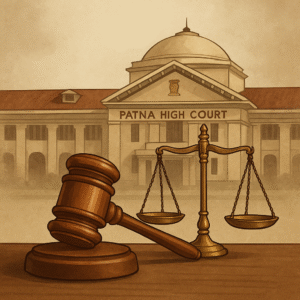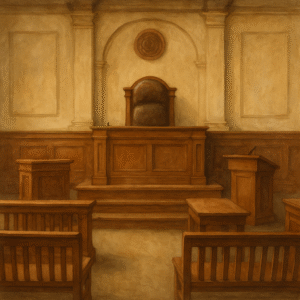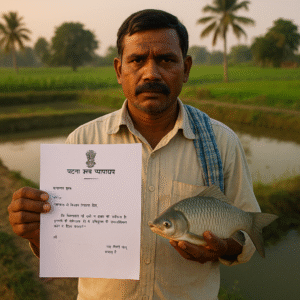Simplified Explanation of the Judgment
The Patna High Court set aside a Rural Works Department order that had blacklisted a contractor for ten years. The case revolved around a road construction contract under the Pradhan Mantri Gram Sadak Yojana (PMGSY) from Tengara Road to Manik Bigha. The petitioner was awarded the contract on 15.01.2018, with a completion deadline of 29.12.2018.
Work began but was disrupted by antisocial elements, reportedly including naxal groups, who demanded levies and hindered construction. The petitioner informed the authorities and sought an extension of time. However, on 30.11.2019, the Executive Engineer rescinded the contract, forfeited security and earnest money, and demanded Rs. 85,521, warning of legal recovery proceedings.
The petitioner challenged the rescission before the Empowered Standing Committee, and the matter went to arbitration. While arbitration was pending, the department re-tendered the same work on 05.06.2020. Interestingly, the petitioner won the re-tender, completed the project successfully, and received payment.
Later, without issuing a specific show cause notice for blacklisting, the department passed an order on 04.01.2022 blacklisting the petitioner for ten years. The petitioner argued that:
- Delays were beyond his control due to law-and-order issues.
- No proper opportunity to be heard was given before blacklisting.
- The same department later entrusted him with the same work, which he completed on time.
- A 10-year blacklisting was excessive and unjustified.
The State contended that the petitioner had been served notice and that principles of natural justice were followed.
The Court examined key precedents from the Supreme Court — Erusian Equipment (1975), Raghunath Thakur (1989), Gorkha Security Services (2014), UMC Technologies (2021), and Kulja Industries (2014) — which hold that:
- Blacklisting requires strict adherence to natural justice.
- Proper notice and fair hearing are mandatory.
- The punishment must be proportionate to the misconduct.
The Court found:
- Though a notice was claimed, the blacklisting order did not discuss or address the petitioner’s reply, making the process an empty formality.
- No plausible reasons were given for imposing a decade-long debarment.
- Proportionality was ignored, despite the petitioner later being awarded and completing the same work successfully.
- The reasons for delay, namely disruption by antisocial elements, were disregarded.
Accordingly, the Court quashed the blacklisting order dated 04.01.2022 as unduly harsh, disproportionate, and procedurally defective.
Significance or Implication of the Judgment
This ruling sends a clear message to government departments:
- Orders carrying civil and penal consequences, like blacklisting, must be reasoned and proportionate.
- Procedural fairness is not optional — authorities must give real consideration to the affected party’s defence.
- If a contractor is later trusted with the same work and performs well, it undermines the basis for long-term blacklisting.
For contractors, it demonstrates that courts will intervene when departmental actions are arbitrary, unsupported by reasons, or excessively harsh.
Legal Issue(s) Decided and the Court’s Decision with Reasoning
- Issue 1: Was a valid and fair show cause process followed before blacklisting?
Decision: No. The order lacked discussion on the petitioner’s defence, making the notice process an empty formality. - Issue 2: Was the punishment proportionate?
Decision: No. Ten years was found excessively harsh and inconsistent with later awarding the petitioner the same work. - Issue 3: Were the petitioner’s reasons for delay considered?
Decision: No. Disruptions beyond the petitioner’s control were ignored.
Judgments Relied Upon or Cited by Court
- Erusian Equipment and Chemicals Ltd. v. State of West Bengal, AIR 1975 SC 266.
- Raghunath Thakur v. State of Bihar, (1989) 1 SCC 229.
- Gorkha Security Services v. Govt. (NCT of Delhi), (2014) 9 SCC 105.
- UMC Technologies (P) Ltd. v. Food Corporation of India, (2021) 2 SCC 551.
- Kulja Industries Ltd. v. Western Telecom Project BSNL, (2014) 14 SCC 731.
Case Title
Arvind Kumar Singh v. State of Bihar & Others
Case Number
Civil Writ Jurisdiction Case No. 1193 of 2022
Coram and Names of Judges
Hon’ble Mr. Justice P. B. Bajanthri
Hon’ble Mr. Justice Arun Kumar Jha
Names of Advocates and Who They Appeared For
For the Petitioner: Mr. Ravindra Kumar Sinha, Advocate
For the Respondents: Mrs. Archana Meenakshee, GP-6
Link to Judgment
https://www.patnahighcourt.gov.in/ShowPdf/web/viewer.html?file=../../TEMP/2a99099e-408d-4237-8c34-073b5127d72b.pdf&search=Debarment
If you found this explanation helpful and wish to stay informed about how legal developments may affect your rights in Bihar, you may consider following Samvida Law Associates for more updates.








